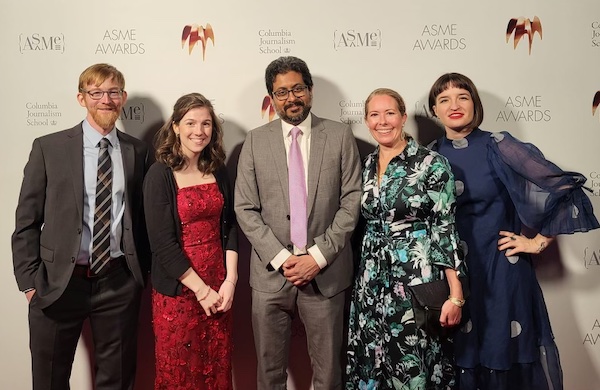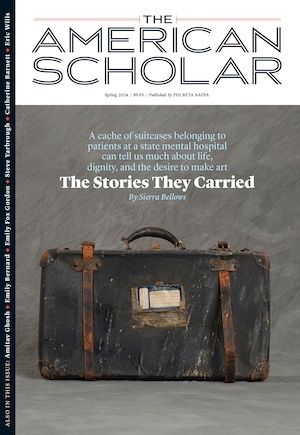By Julie Flandreau
This year again, ΦBK’s literary quarterly, The American Scholar, has done remarkably well at the annual National Magazine Awards. Although it did not win during the ceremony, which took place in New York in early April, the magazine was nominated twice, in two sought-after categories: “General Excellence” and “Reviews and Criticism,” respectively.
Since its launch in 1932, the magazine has collected high-profile awards (from the American Society of Magazine Editors and Utne Independent Press Awards), as well as frequent essay nominations to the Best American anthologies—testaments to the constancy of the quarterly’s quality and the skill of its writers and editorial team.
Sudip Bose, the publication’s editor since 2022, said: “I’m always amazed at the caliber of writer we can attract, given how little compensation we’re able to offer. But this nomination shows that a nonprofit magazine with a full-time staff of five and a circulation of 25,000 can compete with the giants in the business.”
The American Scholar, which has complete financial support from the Society, is quite unique in the playing field of U.S. magazines. It publishes not only works of journalism and personal essays, but pieces concerning history, literature, the arts, and social sciences—everything “to help us understand the world in which we live,” said Bose. Indeed, if the quarterly “enjoys editorial independence [from Phi Beta Kappa], it so happens that our mission aligns perfectly with that of the society. We are an embodiment of [its] core values. We champion lifelong learning, intellectual curiosity, and free inquiry, all the while trying to move and entertain our readers.”

The “Reviews and Criticism” nomination was awarded for an essay by Megan Craig on the celebrated documentary photographer and photojournalist Dorothea Lange, titled The Alphabet of Despair (2023). Megan Craig is an artist and associate professor of philosophy and art at Stony Brook University. Her essay, which used a recent retrospective exhibition at the National Gallery of Art in Washington D.C. on the photographer’s work as its gravitational axis, carefully weaved together Lange’s Depression era-milieu to current, troubled times. In example, writing amidst the wildfires which transformed the light and air of the Northeast in June 2023 (onwards), Craig offers a new look upon what, exactly, is captured in Lange’s Dust Bowl photographs.
The task of selecting, crafting, assembling a magazine issue – one that will carry a consistent, distinctive “feel” as well as a “look”, “one that will invite readers in and encourage them to linger,” is to Mr Bose “the most satisfying and challenging work [he] has ever taken on.” He writes: “There’s very little about the process that I don’t love, from discovering pieces from the so-called slush pile, to seeking out writers I deeply admire, to getting pieces ready for publication through our rigorous editing process.”
This (editorial) process, then, of collection, linkage, research, juxtaposition, generative collation is what gives the publication both form and content, and thus what makes it a tool of lifelong learning, of intellectual rigor and growth. On August 31, 1837, Ralph Waldo Emerson spoke before a gathered audience: “To the young mind, everything is individual, stands by itself. By and by, it finds how to join two things, and see in them one nature; then three, then three thousand; and so, tyrannized over by its own unifying instinct, it goes on tying things together, diminishing anomalies, discovering roots running under ground, whereby contrary and remote things cohere, and flower out from one stem.” Those words were addressed at Harvard College, to a crowd of young ΦBK Society members. The speech from whence they came was widely acclaimed: it was titled The American Scholar, and thereby gave their quarterly a name.
Julie Flandreau graduated from the University of Pennsylvania in May 2023 with a degree in comparative literature and religious studies. She was inducted by the Delta of Pennsylvania chapter of Phi Beta Kappa that same year.




